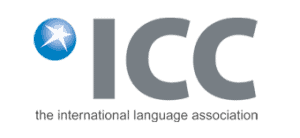About us
The International Certificate Conference (ICC) aims to support the development of quality in language education through training, events, support for teachers, quality assurance and accreditation, through joint developments with other organisations and the good practice of its members.
Contact Us
ICC – The International Language Association
Postfach 10 12 28
D-44712 Bochum

ICC Welcomes New Members at Annual Conference in Athens
Conferences, MEMBERSICC recently extended a warm welcome to new members during its Annual Conference (Transforming Language Education: Diversity, Engagement and Innovation) held in Athens from April 19-21, 2024.Our Co-Chairs, Myriam Fischer and Tatjana Kovac, greeted the newcomers in a memorable moment that saw participants joining both in person and virtually.
LLLWeek 2023 – It’s a wrap!
General NewsThe LLLWeek 2023 was dedicated to LLLP’s theme of the year: “Key Comptecences for All: a Lifelong Learning Approach to Skills”: addressing a topic that is strictly linked to the European Year of Skills offered LLLP members the opportunity to re-formulate some of Europe’s most pressing issues. The 13th edition of the LLLWeek took place on 27 November to 1 December, under the patronage of MEP Dragoş Pîslaru (Chair of the EMPL Committee and a champion of lifelong learning!).
Myriam Fischer and Tatjana Kovac @ 2023 ECML conference in Graz
Conferences, General NewsOn December 13 and 14, in response to the invitation from the European Centre for Modern Languages of the Council of Europe (ECML), our co-chairs, Myriam Fischer and Tatjana Kovac, attended the 2023 ECML conference in Graz, Austria.
ICC Celebrates the 2023 European Day of Languages
General NewsIn the spirit of celebrating linguistic diversity and in observance of the European Day of Languages, we are delighted to announce a forthcoming webinar that extends a cordial invitation to language enthusiasts across the globe. The webinar is scheduled for September 27th, between 5:00 PM and 6:00 PM Central European Time (CET), and we will […]
“A new Council of Europe Recommendation on language education: the importance of teacher education”
NewsletterROLANG School – The first EUROLTA Teacher Training Centre in Romania
EUROLTA, General NewsROLANG School in Bucharest, dedicated exclusively to teaching the Romanian language to foreigners, has become the first language center in Romania offering the internationally recognized teacher training program EUROLTA (European Certificate in Language Teaching to Adults). The EUROLTA certificate is developed, issued and recognised by the ICC, a network of leading institutions of adult education in Europe and around the world.
TEACHING LANGUAGE through ART
General NewsJoin our brand new interactive course for language educators. You get the opportunity to develop your language teaching skills in an international environment. Participants have workshops and brainstorming sessions which focus on using works of art as a tool in language learning classroom. In addition to classes and workshops led by expert facilitators, the course includes visits to cultural spaces and museums, with time to explore and find inspiration. Venice is incredibly international with a wide range of cultures represented in the artwork displayed.
https://europeanculturalacademy.com/courses/educators/teaching-language-through-art
ECML projects
General NewsDigital citizenship through language education
The project seeks to help learners become digital citizens and develop the capacity to use digital media critically, creatively and autonomously in several languages. The project will build on recommendations and guidelines from the Council of Europe and other international institutions as well as on national policies in order to develop a pedagogical framework and resources for use by language teachers.
https://www.ecml.at/ECML-Programme/Programme2020-2023/Digitalcitizenshipthroughlanguageeducation/tabid/4302/language/en-GB/Default.aspx
Developing transversal competences in language education
In many education systems, the development of learners’ transversal competences has become an important focus of policy. Working on learners’ ‘transversal competences’ means developing their knowledge, skills, attitudes and values in areas such as global citizenship, education for sustainable development and media education, and also their intrapersonal and interpersonal ‘21st century skills’, which include co-operation, teamwork, critical thinking, and digital literacy etc.
https://www.ecml.at/ECML-Programme/Programme2020-2023/Developingtransversalcompetencesinlanguageeducation/tabid/4301/language/en-GB/Default.aspx
Developing an agenda and a roadmap for achieving full digital language equality in Europe by 2030
General NewsThe ICC is a member of the ECSPM (European Civil Society Platform for Multilingualism) and thus involved in a very interesting project:
With a large and all-encompassing consortium consisting of 52 partners covering all European countries, research and industry and all major pan-European initiatives, the European Language Equality (ELE) project develops a strategic research, innovation and implementation agenda as well as a roadmap for achieving full digital language equality in Europe by 2030. The whole project is designed in such a way that all individual work streams create input for the strategic agenda, for example, in terms of empirical evidence, desk research or technology deep dives.
Read more: https://european-language-equality.eu/